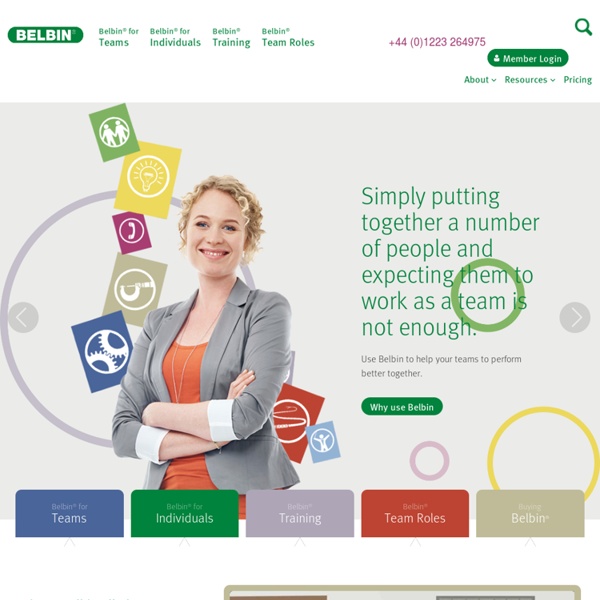



4 Ways to Communicate With Body Language Steps Method 1 of 4: Understanding Your Own Body Language 1Be natural. Even if you were to succeed in controlling your body language "by the book", you would look fake. While there are certain aspects of body language that can be improved upon to create a more effective message, you still need to act like yourself and not be robotic. Ad 2Identify your body language patterns. 3Determine whether your body language is in sync with your message. Method 2 of 4: Gestures 1Emphasize a point. 4Keep a check on other body language signals. Method 3 of 4: Being Aware Of Your Audience 1Recognize people. 2Use facial expressions consciously. Method 4 of 4: General Tips For Effective Communication 1Touching one's face signals anxiety. 4Say what you mean. Tips Do not try to read too much into a stranger's body language. Ad Warnings Understand that people are liable to misinterpret your body language.
Leadership, Management, Team and Business resources The Sigma Xi Postdoc Survey MarcumSmith: Team Dynamics, Team Communication, Team Development The Team Dynamics Assessment measures how capable teams are to make the leap from good performance to great. The assessment is based on the bestselling work of Catalyst creators David Marcum and Steven Smith. Rather than assess performance on a 1-10 scale and leave it at that, we dive deeper on specific team behaviors that are habits, and when the best habits aren't in play what you're team is doing instead. Team dynamics are the unseen, but not unfelt, forces that impact a team. But most teams aren't great. We ask questions about team relationships in this survey that no one else asks: How often do people talk at the water cooler rather than in the meeting and why? We all talk about these things at lunch or over coffee, so we might as well get it on the table and do something about it. Click the "Create a new team survey" button and find out exactly where your team stands.
Meeting Planning How to Create an Agenda, Step by Step Why agendas are so important and how to create a great one Writing the Script Create the perfect meeting agenda 10+ Tips for Starting (and Finishing) Your Meetings on Time How organizers and attendees can keep meetings on track How Long is Long Enough? Determine how much time you need for your next meeting Things to Consider When Preparing for Your Meetings General considerations for any meeting, big or small Gimme a Break! It's in the Numbers? Holding Off-Site Meetings Get out of the office and get creative Eliminating Free Time Can Be a Costly Mistake Participants need quality free time during long out-of-town meetings Mind Your Meeting Manners How to conduct yourself when meeting outside the boardroom International Etiquette Practical do's and don'ts when meeting in a foreign country Beware, Globe-Trotting Meeters! Meeting Planning Cost-Savings Tips Put together an on-site or off-site meeting that's professional and within budget
Team Building The reader might best be served to first read the topic the Group Dynamics to understand the basic nature of most groups, their typical stages of development and how to support groups to evolve through the early stages. That understanding, along with the guidelines in the following resources, helps the chair or facilitator of the team to support the team to fully develop. Sections of This Topic Include How to Build Highly Effective Teams Building -- Does Team Building Actually Work? Also seeFacilitationGroup Performance Management Group Skills Related Library Topics Also See the Library's Blogs Related to Team Building In addition to the articles on this current page, also see the following blogs that have posts related to Team Building. Library's Leadership BlogLibrary's Supervision BlogLibrary's Team Performance Blog How to Build Highly Effective Teams © Copyright Carter McNamara, MBA, PhD 1. The goals should be designed to be “SMART.” Specific Measurable Achievable Relevant and Time-bound.
PhDs praise quality effort | General Today's postgraduates expect the very best - and they get it, according to our survey. Postgraduate students are overwhelmingly satisfied with the quality of their supervision, according to a survey for The Times Higher , which indicates a huge improvement in the levels of support offered by universities. Today's postgraduate experience is so good that nearly two thirds of research students are planning a career in academe. In an online poll, carried out for The Times Higher by the National Postgraduate Committee, MA and PhD students from around Britain gave the quality of their supervision an average mark of seven out of ten. Nine out of ten was the most common score. Jim Ewing, general secretary of the NPC, which held its annual conference at Strathclyde University this week, said: "We're more used to dealing with complaints around here, but we shouldn't be surprised by the high standard of supervision being reported. Do you feel adequately supervised? Where do you intend to work?
Quote of the Day As we developed the workshop we decided that we wanted to a create a forum for child and youth care workers to better understand the complex and difficult nature of supervision in residential settings for children, to better understand and empathize with the issues their supervisor was facing, and to develop strategies to better “own their own supervision.” We were very clear that if child and youth care workers simply wait for “good supervision” to come to them, the many factors working against this happening in most agencies would likely lead them to much frustration – and for many of the more talented and knowledge-thirsty ones, on a road out of the field of child and youth care. We wanted to provide a model for child and youth care workers to pro-actively take responsibility for their part of the crucial supervisory relationship, and to feel comfortably empowered in doing so. However, in order to enact that process we felt it important to let some of the feelings drain.